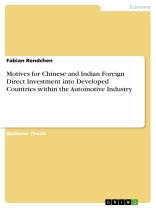Bachelor Thesis from the year 2014 in the subject Business economics – Investment and Finance, grade: 1, 0, University of Applied Sciences Dortmund, course: International Management – International Business, language: English, abstract: Fuelled by integration, trade liberalisation and deregulation the global economy is transforming into an interdependent system. Within this development the internationalisation of companies from developed countries only marked a first stage. The second and current stage sees the rise of emerging market firms investing not only into neighbouring but also into highly developed markets (Baskaran & Chaarlas, 2012; Gaur & Kumar, 2010; Goldstein, 2007a; Karl P Sauvant, Maschek, & Mc Allister, 2009; Williamson, Ramamurti, Fleury, & Leme Fleury, 2013). This trend challenges established internationalisation theories claiming that emerging market firms initially only invest into economies less developed than their own. Therefore it serves as a present, important and moreover heavily discussed area of research (Mathews, 2006; C. Wang, Boateng, & Hong, 2011; C. Wang, Hong, Kafouros, & Boateng, 2012).
Innehållsförteckning
Verkürzte Inhaltsübersicht/Shortened List of Contents
1. Defining the Problem
2. Theoretical Framework
3. China
4. India
5. Cross-Case Analysis
6. Conclusion












